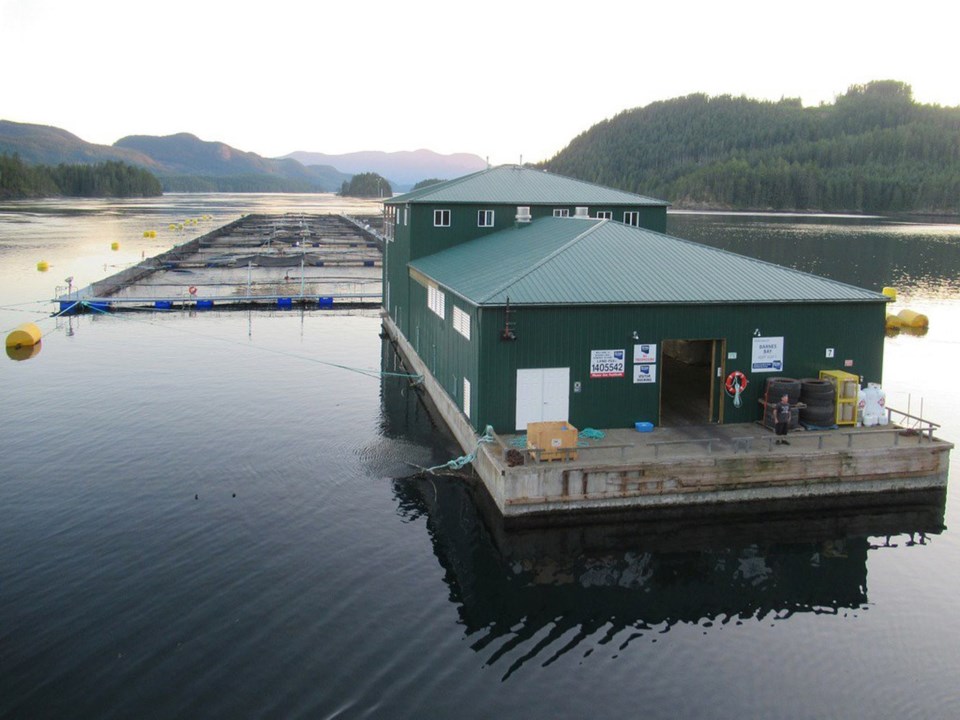B.C. farmed salmon may be pushed off people’s plates by climate change in the coming decades.
Global warming is likely to significantly reduce the areas suitable for the farming of Atlantic salmon along the West Coast, according to a recent UBC study.
Tropical or subtropical regions are likely to see the biggest declines in the number of species they can farm in oceans due to climate change, said Muhammed Oyinlola, the study’s lead author.
But B.C. aquaculture will also face significant challenges associated with warming oceans, said Oyinlola, a researcher with the Institute for the Oceans and Fisheries at the University of British Columbia.
Canada’s Pacific coast is expected to lose between 60 per cent and 84 percent of marine areas favourable to farming Atlantic salmon by 2050, said Oyinlola.
The predicted range of the negative impacts for farming salmon on the B.C. coast depends on whether strong measures to lower global greenhouse gas emissions are enacted, or conversely, if little is done to limit emissions, he said.
The study projected climate change impacts on the diversity of 85 of the most common species of fish and shellfish farmed in ocean waters globally.
In particular, researchers examined the total number of species that could be farmed in certain areas, given specific environmental conditions, Oyinlola said.
There is a short window for the salmon farming sector to plan and adapt to climate change, he stressed.
“Thinking about climate change and the aquaculture industry, we have some time to act now,” Oyinlola said. “Whether we move (operations) further offshore or we move them onto land, we have to start it now.”
Aquaculture plays a big role in global seafood production and its footprint is only growing, said Oyinlola.
Food from aquaculture accounts for nearly half of the 171 million tonnes of seafood consumed globally.
But factors such as rising seas, increasing water temperatures, ocean acidity, changes in salinity, and an increase in disease spurred by climate will affect farming Atlantic salmon, Oyinlola said.
Warming water temperatures can drop oxygen levels for fish and curb their growth, or boost aquaculture-related diseases and parasitic infections, he added.
Farm-raised salmon is B.C.’s highest-valued seafood product and the province’s top agricultural export, according BC Salmon Farmers Association data.
Farmed salmon generates more than $1.5 billion towards the B.C. economy, and supports approximately 7,000 jobs, the association states.
A total of 84.5 tonnes of farmed Atlantic salmon were harvested in 2018, and represented the largest share (57 per cent) of any B.C. seafood species in terms of its landed value of $737.5 million, according to the B.C. Agriculture Ministry.
B.C. salmon farming silent on climate change mitigation
The aquaculture industry is aware of potential impacts of climate change on salmon farm operations and, in some cases, is already working to mitigate those changes through innovations and investment in new technologies, said Shawn Hall of the BC Salmon Farmers Association in an email to the National Observer.
Warming waters are already leading to more algae blooms, which can pose risks to farmed salmon, Hall added.
“With climate change impacting some wild fish species, and the demand for seafood continuing to increase, responsible aquaculture has an important role to play in ensuring global food security, as well as the health of wild salmon populations into the future,” Hall wrote.
However, the association did not clarify what responses or technologies the sector is considering or undertaking to mitigate climate change on Atlantic salmon operations.
Mowi Canada West, which describes itself as the leading salmon aquaculture company in B.C., declined to comment about what measures the company might be taking to adapt its farming operations to the effects of global warming.
Grieg Seafood and Cermaq Canada Ltd., also big players in B.C. salmon farming, did not return requests for comment before the National Observer’s publishing deadline.
Since aquaculture plays such a large role in seafood production, it’s important to determine where farming operations might do better in the future, and what other species of seafood might thrive, Oyinlola said.
Adaption planning paired with regulatory and governance mechanisms would ideally minimize the local environmental and socio-economic impacts of changes from global warming, he said.
Along the B.C. coast, adaption by the industry might mean salmon farming operations will look for different, more suitable, lease sites, or expand favourable existing ones, he added.
Or they might move further out to colder waters with offshore technology or shift operations to land-based systems, Oyinlola said.
Selective breeding or raising a different species or product is also an option for farming operations, the UBC study suggested.
While climate change may pose substantial risks to farmed Atlantic salmon on the B.C. coast, other aquaculture species may benefit, Oyinlola said.
If climate change continues apace, the B.C. coast is project to see a 46 per cent increase in area favourable to farming Pacific oysters, he said.
As marine environments shift, stakeholders — such as aquaculture companies, coastal communities, government and regulatory agencies — can use climate change projections to collaborate and determine what future impacts might be and how to proceed, said Oyinlola.
“We need to know what species are important, particularly to our food security or economic development in terms of aquaculture” he said.
“And how we can retain the incredible biodiversity that we have in this coast and maintain it in a way that also benefits us.”



